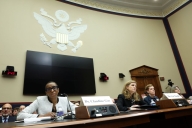You have /5 articles left.
Sign up for a free account or log in.
One of the heated debates in admissions circles these days is whether American colleges should use agents -- whom the institutions pay in part on commission -- to recruit foreign students. A new study suggests that most Chinese undergraduates in the U.S. used agents in the admissions process (although that doesn't necessarily mean their colleges were aware of or involved in the process).
The study may give some ammunition to both sides of the debate over using agents. It found that most of the undergraduates who used them were satisfied with the experience. But it also found that some of the agents engaged in unethical behavior, such as writing student essays or letters of recommendation. The Journal of College Admission, where the study appears, is published by the National Association for College Admission Counseling. NACAC's board has just recommended that the association strengthen its stance against the use of commission-paid agents, saying that their use "introduces an incentive for recruiters to ignore the student interest in the transition to postsecondary education, and invites complications involving misrepresentation, conflict of interest, and fraud at the expense of the student." (The journal includes a note on the new study stating that it was submitted and accepted for publication prior to the decision by NACAC's board.)
The study was based on a survey of more than 300 Chinese undergraduates at four colleges and universities in the United States -- three of which do not pay agents to act on their behalf. And yet just under 60 percent of the students said that they used agents to help in the visa and application process.
Some of these agents are likely the same agents who would like to work for American colleges, or who do so. Some agents are paid largely by applicants, others largely by the institutions where students enroll, and still others by a mix. Most admissions experts agree that there is wide variation in the quality and ethics of services provided by agents in China.
"I think we learned that U.S. institutions may boldly proclaim that, 'We do not work with agents,' but at the same time will receive students who have worked with agents without their knowledge, so we do not know the extent of their reach," said Linda Serra Hagedorn, associate dean of undergraduate programs at Iowa State University and a co-author of the study. (The other author is Yi Zhang, who just finished her Ph.D. in higher education at Iowa State and is about to start a postdoc there.)
Hagedorn added that the survey results suggest that many Chinese undergraduates "would not be able to perform the necessary steps" to enroll in the United States without agents. But she also said that "there are opportunities to exploit and some agents do." For Hagedorn, "the bottom line remains that we -- the U.S. -- cannot legislate what happens in other countries."
Of the nearly 60 percent of those surveyed who reported using agents, the top motivation for doing so (cited by 72 percent, although more than one factor could be cited) was lack of knowledge about the admissions process. Nearly 40 percent of those using agents also said that they believed their chances of admissions would be improved.
Asked what services agents provided, nearly 80 percent reported help in the visa application process (a major source of anxiety for Chinese applicants to American colleges), more than 70 percent said that the agent helped them pick the best country and/or institution for college, about two-thirds said that the agents helped in the preparation of application materials, and more than 60 percent said that agents initiated communication with colleges, professors or recruiters.
The question of how much preparation of materials is legitimate is key for those worried about whether the applications actually reflect the applicants. The study notes that the researchers "uncovered cases where agents crossed the line" by writing personal statements or other materials. One student interviewed by the researchers said that "my agent wrote the recommendation letters for me. I just need to provide three names of my high school teachers or college instructors and he took care of the rest."
Hagedorn said that while only a few students admitted using agents in this way, she suspected that others did so as well. "No one knows the true extent of misuse or inappropriate activities with respect to agents. If it is unethical, people won't report it," she said.
Generally, the students who used agents were happy with their choices, with 70 percent saying that they were satisfied with the services provided, two-thirds saying that they would recommend the same agent to a friend, and about 57 percent reporting that prices had been reasonable. (Pricing varies widely and depends in part on whether agents are paid entirely by the applicant or also -- or instead -- by the colleges doing recruiting.)
In interviews, students reported some concerns over the lack of involvement with agents once they had been admitted. They also reported receiving relatively little assistance with the transition to college in the United States.
A key limitation of the study is that it does not link the trends identified to particular agents or companies. Even strong proponents of using agents admit that many of them are unscrupulous. And the argument in favor of using agents tends to stress the need to regulate the industry so that applicants can be steered to reputable guides. Critics, however, say that any pay by U.S. colleges based on commission creates conflicts of interest. They also note that commission-based pay is barred by law in the United States.








